One natural tendency in English runs strongly against etymology. This is the tendency to throw the stress back, which about a century ago turned ‘cont[’e]mplate’ into ‘c[’o]ntemplate’ and somewhat later ‘ill[’u]strate’ into ‘[’i]llustrate’. Shakespeare and Milton pronounced ‘instinct’ as we pronounce ‘distinct’ and ‘aspect’ as we pronounce ‘respect’. Thus Belarius is made to say
’Tis
wonder
That an invisible inst[’i]nct should
frame them
To royalty unlearn’d,
and Milton has
By this new felt attraction and instinct,
and also
In battailous asp[’e]ct and neerer view.
The retrogression of the stress is in these instances well established, and we cannot quarrel with it; but against some very recent instances a protest may be made. One seems to be a corruption of the War. In 1884 the N.E.D. recognized no pronunciation of it save ‘all[’y]’, as in Romeo’s
This gentleman, the prince’s neer Alie.
The late Mr. B.B. Rogers in his translations of Aristophanes has of course no other pronunciation. His verses are too good to be spoiled by what began as a vulgarism. Another equally recent vulgarism, not recognized by the N.E.D. and bad enough to make George Russell turn in his grave, is ‘m[’a]gazine’ for ‘magaz[’i]ne’. It is not yet common, but such vulgarisms are apt to climb.
In times not quite so recent the word ‘prophecy’ has changed, not indeed its stress, but the quantity of its final vowel. When Alford wrote ‘The Queen’s English’, every one lengthened the last vowel, as in the verb, nor do I remember any other pronunciation in my boyhood. Now the N.E.D. gives the short vowel only. Alford to his own satisfaction accounted for the long vowel by the diphthong ei of the Greek. It is to be feared that his explanation would involve ‘dynast[=y]’ and ‘polic[=y]’, even if it did not oblige us to turn ‘Pompey’ into ‘Pomp[=y]’. In this case it may be suspected that the noun was assimilated to the verb, which follows the analogy of ‘magnify’ and ‘multiply’. The voice of the people which now gives us ‘prophec[)y]’ seems here to have felt the power of analogy and assuredly will prevail.
ON PROPER NAMES.
It is to be hoped that except in reading Latin and Greek texts we shall keep to the traditional pronunciation of proper names as it is enshrined in our poetry and other literature. We must continue to lengthen the stressed penultimate vowel in Athos, Cato, Draco, Eros, Hebrus, Lichas, Nero, Otho, Plato, Pylos, Remus, Samos, Titus, Venus, and the many other disyllables wherein it was short in the ancient tongues. On the other hand we shall shorten the originally long stressed antepenultimate vowel in Brasidas, Euripides, Icarus, Lavinia, Lucilius, Lydia, Nicias, Onesimus, Pegasus, Pyramus, Regulus, Romulus, Scipio, Sisyphus, Socrates, Thucydides, and many more.




